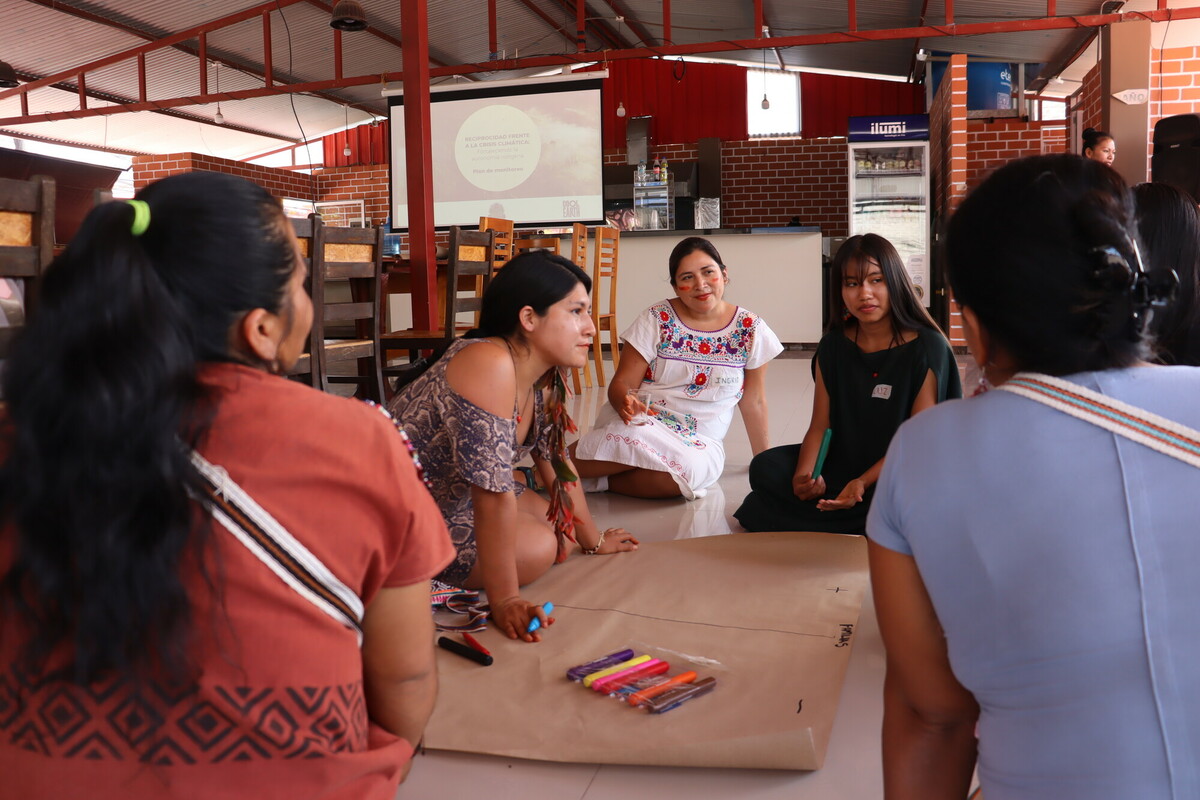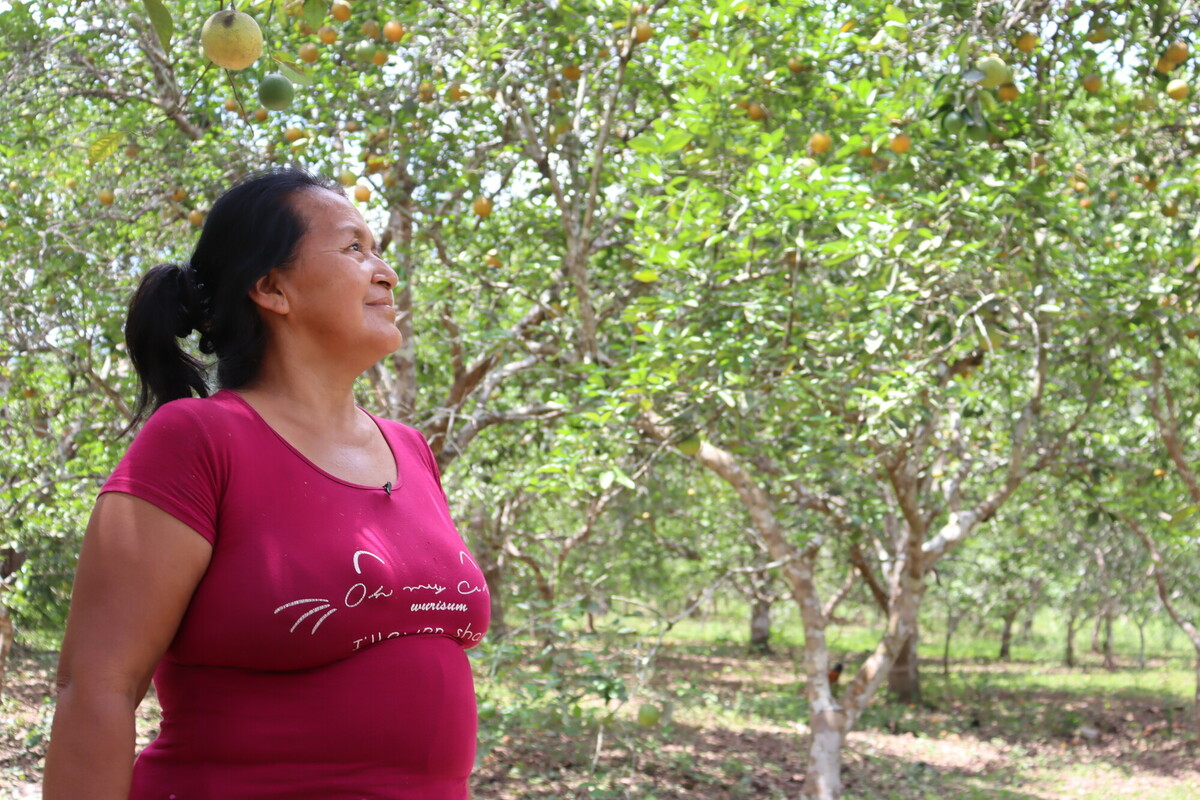Basic Income: Early results show significant impact
Deep in the heart of the Amazon, our groundbreaking basic income pilot is offering a glimmer of hope in the fight against climate change. It suggests the best possible way to save rainforest is to simply give £2 a day to the people who live there.
The World’s first basic income pilot for Indigenous peoples who live in rainforests, a collaboration between Cool Earth and two female-led Indigenous groups ONAMIAP and OMIAASEC, provides regular income to adults in three Asháninka and Yánesha communities in Peru.
The aim? To support strong and resilient Indigenous communities that have their most urgent needs met. This is crucial because the survival of the rainforest is directly linked to the health and resilience of the people who live there.
“Indigenous peoples have a balanced and respectful relationship with the rainforest.” says Patricia Quiñones, who is leading the pilot at Cool Earth. However, they face huge challenges and a lack of basic human rights such as access to food, clean water, and healthcare.
“Along with this they are dealing with the devastating effects of the climate crisis, their communities face wildfires, droughts and even flooding. This pilot is a bold step towards empowering them to not only survive but thrive, ultimately protecting the rainforests that are crucial for the health of our planet.”


The ONAMIAP, OMIASEC and Cool Earth teams preparing the basic income sign up process for the Asháninka and Yanesha communities in Peru.
Resilience and empowerment is at the heart of the pilot
Basic income is a valuable tool enabling Indigenous peoples who live alongside the rainforest to invest in their futures without the need to sell their land or trees.
Early data from one of the communities in the pilot suggests positive trends, including:
- Improved nutrition: Prior to the pilot, 9 out of 10 people living in the rainforest reported struggling with a lack of food. Early results from the pilot show families now have better access to food.
- Independence: 8 out of 10 families rely on growing crops for food and income. So far, we’ve seen that families are now able to invest and dedicate more time towards food growing.
- Reduced pressure: With money to spend and address urgent needs, families now have fewer financial worries and are more actively involved in reforestation and conservation activities.
“Rainforest communities are critical custodians of the world’s most valuable natural capital. We all have a responsibility to support them” says Johan Rockström, Scientist and Director of the Potsdam Institute for Climate Impact Research. And it works; deforestation is up to 82% lower in Cool Earth partnerships, than in surrounding areas.
So why basic income?
Cash is not new to us at Cool Earth, in fact we’ve been providing cash to rainforest communities for over 16 years. Patricia continues, “When we transfer cash to communities the whole community comes together to decide how it could be spent.”
“In the 16 years we’ve seen communities use cash to buy things like water tanks so families have access to safe drinking water, build classrooms so that children can go to school, and purchase solar lights so communities can continue to work and look after their families long after the sun has gone down.”
“At the heart of our approach is the fact that we respect the autonomy of the communities we work with, and trust their ability to make decisions based on the unique circumstances they face living in the rainforest and in a climate crisis”, adds Patricia.


Luisa Manuela García – a member of ONAMIAP.
Co-creation and collaboration
With 16 years experience working with rainforest communities around the world, we know that projects cannot be imposed. The ideas and solutions must come from the communities themselves.
The basic income pilot is no different, and is why in 2022 Cool Earth joined forces with ONAMIAP and OMIAASEC. By co-creating and co-implementing the pilot together, we can ensure it respects the needs and knowledge of the communities involved.
Looking ahead
“From the Asháninka and Yánesha women, this spirit of struggle and connection has been passed down to ensure that Mother Nature does not disappear”, Ketty Marcelo, President of ONAMIAP.
“Financial support, in every form, whether it is unconditional cash transfers to whole communities or a basic income to individuals, is the fastest and most direct way of supporting rainforest communities and preventing poverty, which is one of the main drivers of deforestation”, Patricia concludes.
The pilot is ongoing and we are gathering data about how a basic income is helping with the urgent needs of Indigenous peoples being affected by the climate crisis. More findings will be shared when further trends are identified. The goal? To learn whether this method is appropriate, ethical and cost effective. To inspire others to replicate this model and to co-create basic income programmes for rainforest communities globally.
Studies for further reading:
Universal Basic Income as the solution to addressing inequality
